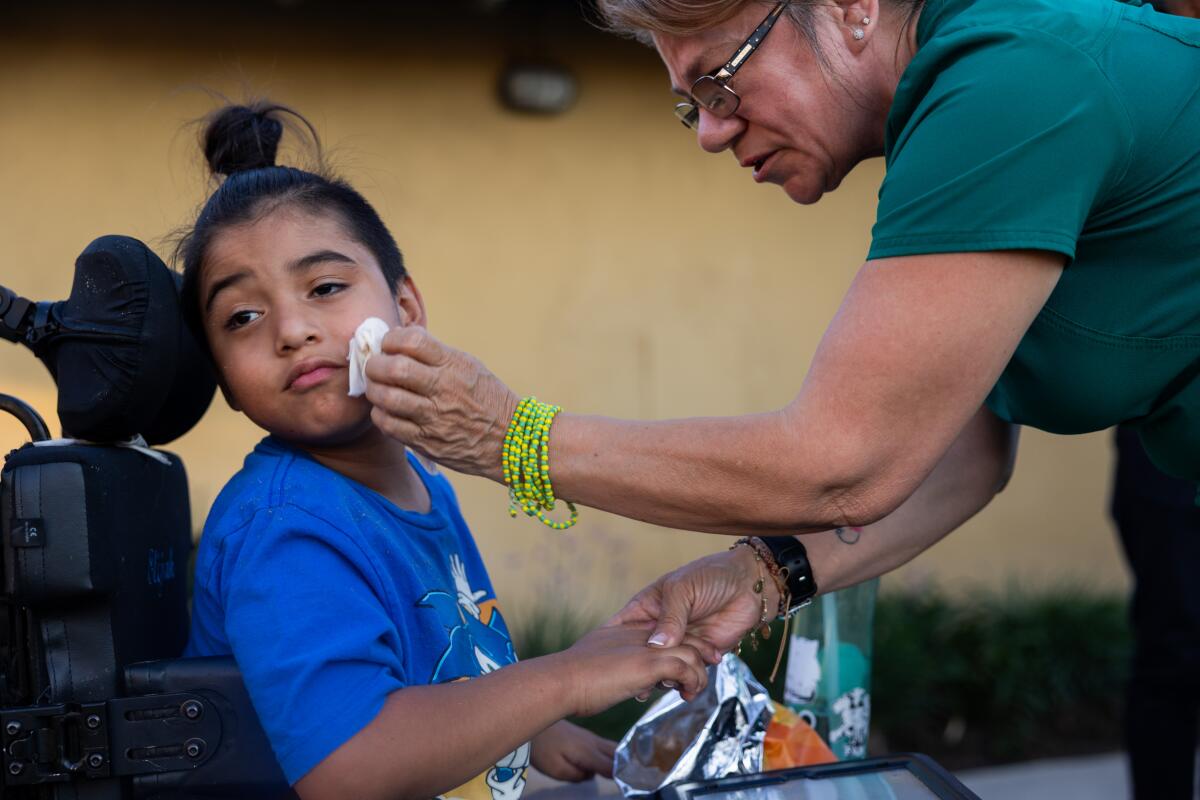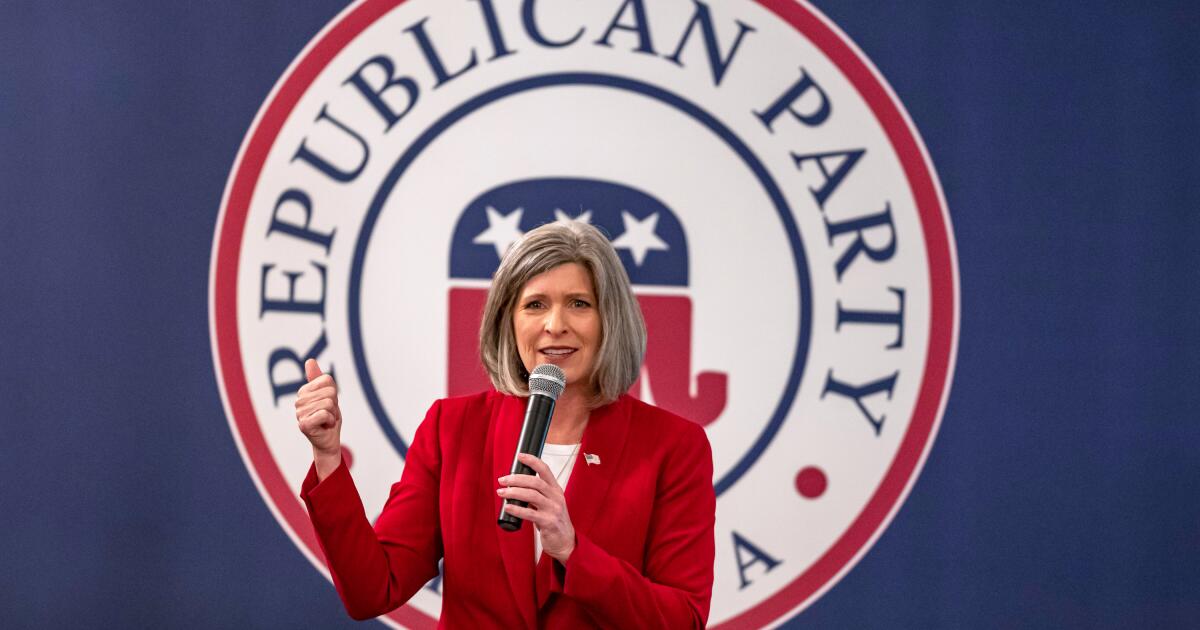How California families are already bracing for looming Medicaid cuts
Ever since Elijah Maldonado was born at just 29 months, he has needed specialty treatments that his family could afford only with publicly funded healthcare.
Diagnosed with cerebral palsy as an infant, he spent his first three months at a public hospital where the family lives in Orange County.
Now 7, Elijah receives physical and speech therapy among a host of other services paid for through Medicaid. He relies on a wheelchair funded by the government. An assistant paid for with taxpayer dollars makes sure he’s safe on the bus ride to and from school.
Each month, he receives a $957 disability check that helps to cover his and his family’s living expenses.
Josephine Rios wipes her grandson Elijah’s face.
(Juliana Yamada / Los Angeles Times)
Still learning to speak on his own, he uses a Proloquo speech app on an iPad provided by his school to tell his family when he’s hungry, needs to use the restroom or wants to play with his favorite toys.
“It’s his voice — his lifeline,” his aunt and primary caretaker Cassandra Gonzalez says of the app. Her compensation for his in-home care comes from taxpayer dollars too.
Now that lifeline — and much of the government assistance Elijah receives — is at risk of going away.
With hundreds of billions of dollars worth of cuts to Medicaid and food aid kicking in this fall thanks to the passage of the Republican-backed “One Big Beautiful Bill Act” — on top of earlier cuts imposed by Elon Musk’s Department of Government Efficiency — a host of federally funded healthcare and nutrition programs that serve low-income Americans will be scaled back, revamped with expanded work requirements and other restrictions or canceled altogether if individual states can’t find alternate funding sources.
The budget reduces federal spending on Medicaid alone by about $1 trillion over the next 10 years nationwide, with initial reductions taking effect in the coming weeks.
Gov. Gavin Newsom responded by accusing the Trump administration of “ripping care from cancer patients, meals from children and money from working families — just to give tax breaks to the ultra-rich.”
L.A. public health officials called the cuts devastating for a county where nearly 40% of the population is enrolled in Medi-Cal, the state’s Medicaid program. L.A. County’s Department of Health Services, which oversees four public hospitals and about two dozen clinics, projects a budget reduction amounting to $750 million a year, and federal funding for the Department of Public Health, which inspects food, provides substance-use treatment and tracks disease outbreaks, will drop by an estimated $200 million a year. Spending cuts have prompted hiring freezes and projections of ballooning budget deficits, county health officials said.
Spending reductions, combined with recent changes to the Affordable Care Act and Medicare, could leave an additional 1.7 million people in California uninsured by 2034, according to an analysis by the nonprofit healthcare research organization KFF.
Cuts to the Supplemental Nutrition Assistance Program (SNAP), colloquially known as “food stamps,” will exceed $280 billion over the next decade, according to projections from the Congressional Budget Office.
It’s not just that the cuts to these programs are massive by historical standards.
The new rules and restrictions are confusing and states have been given little guidance from the federal agencies that oversee health and nutrition programs on how, or even when, to implement them, experts at the Center on Budget Policy and Priorities wrote in a recent report.
What’s clear, the CBPP said, is that millions of children, older adults, people with disabilities and veterans stand to lose not just Medicaid coverage but federal aid to access the type of healthy foods that could prevent illness and chronic conditions.
More than 5 million California households receive food aid through the state’s CalFresh program and 97% percent of them will see their benefits either slashed or eliminated because of federal spending cuts, changes to eligibility requirements or financial constraints at the state level, according to an analysis by the nonpartisan California Budget Policy Center.
Elijah plays with toy cars outside his aunt’s home in Tustin.
(Juliana Yamada / Los Angeles Times)
In Orange County, where Elijah’s family lives, public health officials were already reeling from federal spending cuts in the months before the budget bill passed, said Dr. Veronica Kelley, director of the OC Health Care Agency. For example, there was the $13.2-million cut to funding for family planning services in the county, and the $4-million reduction in funding to Women, Infants and Children nutrition (WIC).
The agency has worked to prevent mass layoffs by moving public-health workers in canceled programs to other departments or leaving some positions unfilled in order to save jobs elsewhere, and it has sought out nonprofit social service organizations and philanthropies to either take over programs or help fund them, Kelley said.
Now, Kelley is preparing for possible cuts to programs to combat obesity, maintain community gardens, help seniors make better healthcare decisions and reduce the use of tobacco. The agency also has to figure out how to make up for a $4.8-million reduction in federal funds for the county’s SNAP program that takes effect on Wednesday — another casualty of the federal spending bill.
The measures that the agency has leaned on to get through the year are not sustainable, Kelley said. “We can only do that for so long,” she said. “It’s chaotic. In terms of healthcare, it’s devastating… It feels like we’re taking so many steps backward.”
The looming cuts and changes have also set off alarm bells at Kaiser Permanente, California’s largest private healthcare provider with 9.5 million members statewide, 1.1 million of whom are enrolled in Medi-Cal, the state’s Medicaid program.
“Without the ability to pay, newly uninsured people will find themselves having to delay care, leading to more serious and complex health conditions, increasing the use of emergency services and more intensive medical services,” Kaiser Permanente Southern California Regional spokeswoman Candice Lee said in a statement to The Times.
“This will affect all of us as the cost of this uncompensated care leads hospitals and care providers to charge paying customers more to cover their costs. Some hospitals and providers, especially those in rural and underserved areas, will be unable to make up for these unreimbursed costs, and will be financially threatened by these changes.”
Standing in front of her sister Cassandra’s town home in Tustin, a quiet suburban city of 80,000 about 10 miles south of Disneyland, Elijah’s mother, Samantha Rios; grandmother Josephine Rios; and Aunt Cassandra are filled with worry.
Elijah points to a command on his Proloquo speech app, which he uses to communicate his needs.
(Juliana Yamada / Los Angeles Times)
Josephine, a nursing assistant who works at a Kaiser hospital in Orange County, said she hears the panic in patients’ voices when they describe rushing to schedule needed medical procedures in anticipation of losing their Medicaid benefits.
Earlier this year, Josephine joined delegations of unionized California healthcare workers who traveled to Washington with the aim of pressing lawmakers to oppose spending cuts.
Rep. Young Kim, the Republican who represents the Rios family’s district in Congress, was receptive to the delegation’s pleas to vote no on the budget bill, Josephine recalls. The congresswoman ultimately voted for the bill, saying on her official webpage the legislation was good for Californians because it would relieve the tax burden on families, ensure that government dollars are used effectively and “strengthen Medicaid and SNAP for our most vulnerable citizens who truly need it.”
Elijah’s Aunt Cassandra and grandmother Josephine look over his shoulder as he watches a TV show.
(Juliana Yamada / Los Angeles Times)
Now, Josephine looked on as Elijah, seated in his wheelchair, played on his iPad and watched a Disney program on his phone. He can press a tab on the touchscreen to make the tablet say “My name’s Elijah” if he’s feeling unsafe away from home, another to tell his family he needs space when upset.
Watching Elijah enjoy himself, the women said they feel awkward broadcasting their woes to strangers when all they desire is what’s best for him. They don’t need the public’s pity.
The family wants lawmakers and the public to understand how seemingly abstract healthcare decisions involving billions of dollars, and made 2,000-plus miles away in Washington, have brought new financial turmoil to a family that’s already on the edge financially.
Samantha, a single mom, works full time to provide a home for Elijah and his two sisters, ages 10 and 8. A subscription to the Proloquo speech app alone would cost $300 a year out-of-pocket — more than she can afford on her shoestring budget.
Due to changes in household income requirements, Samantha had already lost Medicaid coverage for herself and her two girls, she said, as well as her SNAP food assistance, leaving her at a loss for how to fill the gap. She now pays about $760 a month to cover her daughters and herself through her employer-based health plan.
The cut to food aid has forced her to compensate by getting free vegetables, milk, eggs and chicken from the food pantry at a local school, a reality that she said she was at first too ashamed to disclose even to relatives.
Then came the bad news Samantha recently received about Elijah’s monthly Social Security Insurance for his disability. She was stunned to hear that because of stricter income cut-offs for that type of aid, Elijah would no longer receive those checks as of Oct. 1.
“Before, he was getting $957 a month — obviously that’s grocery money for me,” Samantha said. The money also went to buy baby wipes, as well as knee pads to help him move more comfortably on the floor when not using his wheelchair.
“I don’t get food stamps. I don’t get Medi-Cal for my girls. I don’t get any of that,” Samantha said. “As of Oct. 1, now I’ve got to figure out how am I going to pay my rent? How am I going to buy groceries?”
Luckily, the sisters said, the physical, speech and behavioral-health therapies that Elijah receives are safe — for now.
And the women know they can lean on each other in tough times. The sisters and Josephine all live within minutes of each other in Tustin, close enough for Samantha’s children to eat at someone’s home when their own cupboards are bare.
Every few months, Samantha said, Elijah experiences severe seizures that can last up to 90 minutes and require hospitalization.
Cassandra and Josephine like that they can run over to help if Elijah has a medical emergency. Another sister who lives farther away is on hand when needed too.
“What’s going to happen to other families who don’t have that support system?” Samantha said.
Given the potential for further cuts to programs that pay for home-based healthcare and assistants for people with disabilities, Cassandra wonders what will happen to her own family if she can no longer work as Elijah’s caregiver.
Where would the family get the money to pay a new caregiver who is qualified enough to work with a special-needs child who can speak a few words thanks to speech therapy but who cannot eat, walk or use the restroom without supervision? What if funding is eliminated for the assistant who travels with Elijah to school?
“People think that cutting Medi-Cal, cutting food stamps or whatever isn’t going to affect that many people,” Cassandra said. “It’s affecting my nephew and nieces. It’s affecting my sister. But it’s not just affecting her household. It’s affecting my household.”
“We’re not saying we’re going to Disneyland or going out to eat every day,” Cassandra said. “This is just living. We can’t even live at this point, with things being cut.”
The women offered up principles they feel are in short supply lately in the discourse over the government’s role in public health — among them “morals” and “empathy.” Samantha adds one more word to the list.
“Humanity,” she says. “We lack it.”


